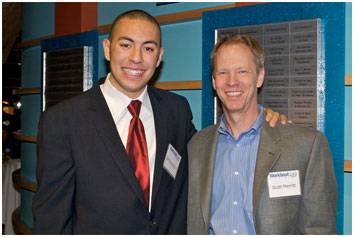PMI Graduates New Foss Mate
As the maritime industry enters a decade of change, next generation mariners like Sam Anderson will learn their chosen profession's safety and environmental skills at places like the Seattle-based Pacific Maritime Institute (PMI).
Scott Merritt, Foss Maritime's senior vice president for operations, recently addressed Anderson and other graduating cadets of PMI's workboat mate program. The institute's two-year program was established specifically so young mariners can be trained for jobs even as today's deck officers reach retirement age.
The advantage for both the maritime industry and cadets is readily apparent: PMI solves a critical problem for companies by getting trainees through the maritime industry's regulatory labyrinth and licensed quickly. Without such a program, an individual might take more than three years -- working every day -- to get the same license.
Young mariners would either have to find a non-paying position as an extra watch stander or a company would have to be willing to pay them for the extra position for 18 months. PMI reduces that time to just six months.
Foss sponsored Anderson, the son of the late Puget Sound pilot Will Anderson, in the program that combines classroom work with practical time at sea.
Merritt told the graduates that about 35 percent of the maritime industry's seagoing personnel will be retiring over the next decade. Meanwhile, the U.S. Bureau of Labor and Statistics predicts that maritime industry growth will mean an 18 percent increase in personnel over the same time. Taken together, the maritime industry anticipates that there will be a 53 percent turnover rate among maritime personnel during the next 10 years.
PMI, a non-profit vocational center sponsored by companies in the maritime industry, is playing an important part in ensuring that new workers have the highest quality training in using new technologies. The institute provides customized courses and related services based on the specific needs of sponsoring companies.
The Foss official told the graduates what sorts of skills and values those hiring are looking for. He said the cadets have the good fortune to be among the first generation of mariners who can look forward to careers in a zero-incident industry culture. And he urged them not to hesitate to speak up whenever they witness unsafe behavior.
"You might be wrong, but you might just be right and save a life," Merritt said.
Regarding safety, the Foss executive said graduates are entering their careers already embracing the zero-incident culture.
"They believe that zero is possible, that they'll never have to go through an oil spill, that they will never have to go through an injury, they will never have to go through the grief of attending the funeral of a shipmate . . .We won't have to explain to them that every incident starts with a preventable, unsafe act. We won't have to explain to them that safety can't be managed with an executive top-down program, but that it starts with the recognition by the individual on the deck plates of a hazard.
Said Merritt, "They are encouraged to step up and stop that unsafe behavior from happening."
Anderson also spoke to the gathering. He thanked captains, mates and deckhands for teaching him the ropes during his sea time, including working on Foss tugs at Red Dog in the Alaskan Arctic, in the Gulf of Mexico, in Central America and on Puget Sound.
He said that with the privilege of having the opportunity to become a deck officer comes great responsibility.
"We have a big responsibility for environmental stewardship, taking care of the ocean that we sail on," said Anderson, who hopes to attend California Maritime Academy. "We also need to continue to develop a strong safety culture -- safety for our crews and safety for our vessels."

















